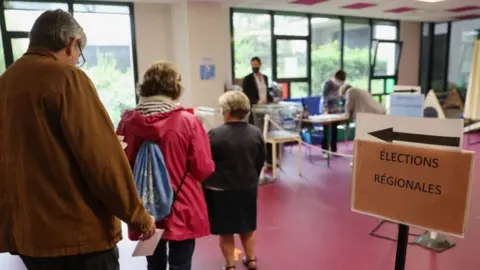France elections: Tough lessons for presidential rivals
 AFP/Getty Images
AFP/Getty ImagesThe results of regional elections in France are being scrutinised for early indications about next year's presidential race.
Here are five takeaways from the elections, which present a more complicated picture than many had expected.
1. Nothing inevitable about hard right
Marine Le Pen's far-right party is being cast as the big loser in the regional vote. Which is a trifle unfair. In the PACA (Provence-Alpes-Côte d'Azur) region on the Mediterranean her candidate probably would have won but for the left-winger standing down. It shows that the far right - even as the biggest party - is still highly vulnerable when its opponents gang up against it.
No, if the National Rally (RN) is the loser it is because it was expected to be the winner. Before the first round there was talk of it gaining not just PACA but maybe two or three other regions. Instead it has nothing - and its chance to prove its credentials as a trustworthy party of power has gone.
This is going to lead to unhappy ructions within the party, which holds its annual conference in Perpignan next weekend. There are voices calling for Marine Le Pen to return to her party's core values: opposition to immigration and Islam, and support for national sovereignty. She has gone soft, these voices are saying, and look where it's got us.
2. Don't misinterpret the pro-incumbent vote
Some are calling these elections a triumph for democracy, because for once the incumbents all got re-elected. In other words, the French voter has moved on from his/her obsession with ousting those in power and is now reflecting maturely on their merits.
Nothing could be further from the truth. There is no encouragement at all for President Emmanuel Macron in these results. Far from being the end of anti-incumbency, they are the furtherance of anti-incumbency. Because for most French voters, the incumbent is him.
The president may feel protected by his strong personal ratings (as opposed to his party's dismal ones), and by the knowledge that the presidential race is a very different affair from the regionals.
But the anti-Paris, anti-establishment feeling that first manifested itself with the yellow vest protesters (gilets jaunes) is very much alive in the country and waiting for a chance to bite. President Macron is in fact very vulnerable.
 Getty Images
Getty Images3. Left-right has not disappeared
The old parties of right and left have been waiting for this moment for nearly five years. Tired of being told that the new politics is about Macron versus Le Pen, open versus closed, forward versus backward, they are delighted to be able to show that competence, organisation and yes, ideology, still count for something.
All 12 French mainland regions were retained by the parties that ruled them already - and this offers both a vindication and a boost for those centre-righters and centre-lefters who now want to enter the presidential fray.
Inevitably it is the centre-right which is drawing the most succour from the results. This is because the battleground to decide who will be the challenger against Mr Macron next year is situated on the right. It is Ms Le Pen versus Xavier Bertrand or Valérie Pécresse or Laurent Wauquiez.
4. French politics is splintering
In several of the second-round regional votes on Sunday there were four candidates competing. In two of them there were five candidates (a quinquagulaire in French). This is unprecedented and not what the system was designed for.
The two-round vote - which also applies in presidentials - was built on the assumption of two broad camps, one left and one right. In the second round, the champions of each would rally their side and slug it out.
But the changing face of politics means there are now several parties with a reasonable chance of making it to the second round. In regional elections the qualification is a minimum 10% first-round vote - which is why so many made it through.
In the presidentials it is different: only the top two candidates go through. But that means that the first round suddenly becomes crucial. What if Macron, Le Pen, a centre-right candidate, a Green-Socialist alliance candidate and a far-left candidate like Jean-Luc Mélenchon are all hovering around the 17% mark? Fancy a Le Pen-Mélenchon run-off anyone?
 AFP
AFP5. Abstention makes the heart grow fonder
Yes, abstention was indeed the big winner at the regionals - 66% not voting is a record (if you exclude referendums). It means the results are impossible to interpret and even those who did badly - like Ms Le Pen and Mr Macron - can use abstention to explain away their disappointment.
Some say it is part of a democratic crisis. What is more obviously true is that the French - like others - view politics through a national prism. Regional elections do not excite - except when there is a chance to give the government a kicking. And as we have seen, in these elections there was no such chance because Macron's party barely exists in local politics.
But next year's presidentials are a different matter. There, the people will turn up to vote.
